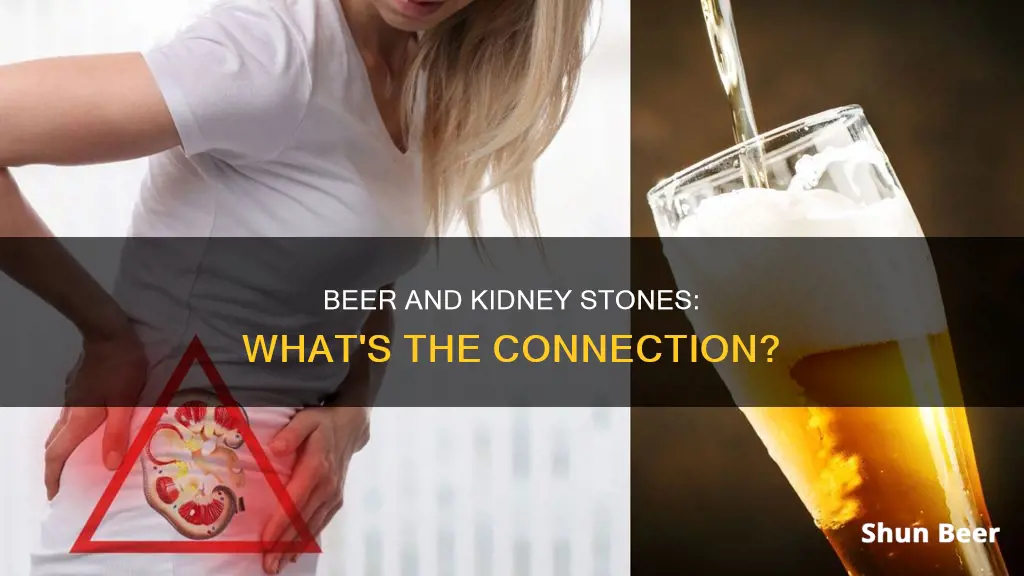
Alcohol consumption has been linked to kidney stones, but the relationship between the two is complex and not yet fully understood. While alcohol is associated with various health problems that are risk factors for kidney stone formation, there is no strong correlation between kidney stones and alcohol consumption. However, excessive alcohol consumption can increase the risk of developing kidney stones in several ways, and alcoholism has direct effects on their formation.
| Characteristics | Values |
|---|---|
| Does alcohol cause kidney stones? | No, but it can increase the risk of developing kidney stones. |
| How does alcohol cause kidney stones? | Alcohol is associated with various health problems that are risk factors for kidney stone formation, such as diabetes, obesity, kidney injury, fibrosis, and inflammation. Alcohol abuse can also lead to severe dehydration, which is one of the reasons behind stone formation in the kidney. |
| Types of kidney stones | Calcium stones, uric acid stones, struvite stones, and cystine stones. |
| Risk factors for kidney stones | Dehydration, diet, weight gain, and poor diet. |
| Symptoms of kidney stones | Severe pain and cramping in the back and sides, persistent and intense urge to urinate, pink, brown, or red-colored urine, foul-smelling urine. |
| Treatment options for kidney stones | Depending on their size, they can be passed naturally during urination. For larger stones, treatment options include shock wave lithotripsy, laser lithotripsy, ureteroscopy, nephrolithotomy, and open surgery. |
What You'll Learn

Beer and kidney stones
Kidney stones are crystallized masses of waste products from urine. Minerals and salts are naturally found in the urine, but high levels of these substances can lead to the development of kidney stones. Kidney stones may grow in size and can be extremely painful, and even prevent you from passing urine.
Alcohol does not directly cause kidney stones. However, excessive alcohol consumption can increase your risk of developing kidney stones in several ways. The most common way this happens is through dehydration.
Beer and grain alcohol can cause kidney stones due to their high concentration of purines. Purines are chemical compounds that can lead to uric acid kidney stones. Drinking alcohol can also lead to severe dehydration, which is one of the many reasons behind stone formation in the kidney.
Alcohol's Effect on the Kidneys
Research has shown that long-term consumption of heavy amounts of alcohol can negatively affect the kidneys. Heavy drinking can, over time, increase a person’s likelihood to develop chronic kidney disease. High levels of alcohol consumption may initiate or promote cardiovascular-related risk factors for kidney disease such as high blood pressure, insulin resistance, diabetes, and excess uric acid in the blood.
The main function of the kidneys is to filter waste from the blood. When the kidney malfunctions, it can lead to an imbalance of fluids and certain electrolytes. Chronic alcohol use, subsequent nutritional deficits, and associated hormonal imbalances may further contribute to renal dysfunction.
Preventing Alcohol-Related Kidney Stones
The best way to prevent kidney stones from alcohol is to drink in moderation or abstain from alcohol. Drinking plenty of water after drinking alcohol can also help avoid kidney pain.
Ginger Beer Before a Colonoscopy: Safe or Not?
You may want to see also

Alcohol and dehydration
Alcohol is a diuretic, meaning it increases the passage of urine. This causes the body to remove fluids from the blood through the renal system, which includes the kidneys, ureters, and bladder, at a much quicker rate than other liquids. As a result, a person loses vital fluids and electrolytes, leading to dehydration. Dehydration occurs when the body does not have enough fluids to function effectively.
Drinking alcohol on an empty stomach can contribute to dehydration as the alcohol is absorbed directly into the bloodstream within minutes, rather than being absorbed more slowly through the stomach and small intestine. Additionally, large amounts of alcohol can suppress appetite, leading to less food consumption and faster alcohol absorption.
Alcohol also negatively affects kidney function, decreasing their ability to filter blood and maintain fluid and electrolyte balance in the body. It suppresses the release of the antidiuretic hormone vasopressin, which controls how much water the kidneys reabsorb and retain. This reduced fluid retention further increases urination.
The risk of dehydration is higher in older adults and people with chronic conditions. It is important to take steps to prevent dehydration before, during, and after alcohol consumption, such as drinking alcohol in moderation, drinking water or other hydrating beverages, and eating hydrating foods.
Excessive alcohol consumption can lead to severe dehydration, which is one of the risk factors for kidney stone formation. Kidney stones are hard objects formed from chemicals in a person's urine and can cause intense pain and other symptoms such as chills and fever. While there is no direct causality between alcoholism and kidney stones, the negative effects of excessive alcohol consumption can increase the risk of kidney stone formation.
Drinking Beer with Invisalign: What You Should Know
You may want to see also

Alcohol and weight gain
Alcohol consumption can have a significant impact on weight gain, and this relationship is influenced by various factors. Firstly, alcohol is high in calories, with some mixed drinks containing as many calories as a meal. For instance, a pina colada can have about 380 calories in a 7-ounce (207 mL) glass. These empty calories provide no nutrients, and drinking alcohol can replace the consumption of healthier, more filling foods. Additionally, alcohol can lead to greater hunger and cravings for salty and greasy foods, further contributing to weight gain.
Secondly, alcohol interferes with the body's ability to burn fat. When alcohol is present in the system, the body prioritises burning it over other sources of energy, such as fat or sugar. This means that the fat and sugar consumed alongside alcohol are more likely to be stored, leading to weight gain. Alcohol also inhibits "lipid oxidation," making it harder for the body to burn existing fat.
Thirdly, drinking alcohol can lead to poor food choices and increased consumption of high-calorie diets. Studies indicate that heavy drinkers tend to consume diets higher in calories, sodium, and fats. This can result in an increased amount of belly fat, which is associated with a higher risk of developing chronic health issues such as diabetes, high blood pressure, and certain types of cancers.
Finally, excessive alcohol consumption is often associated with other negative health effects, including high blood pressure, insulin resistance, heart disease, stroke, liver disease, and some cancers. Therefore, it is crucial to monitor alcohol intake as part of a balanced diet, regardless of weight management goals.
While the relationship between alcohol consumption and weight gain is complex and influenced by individual factors, reducing alcohol intake can be a beneficial step towards managing weight.
Beer Drinking Rules in North Carolina's Parks
You may want to see also

Alcohol and liver disease
Alcohol-related liver disease (ARLD) refers to liver damage caused by excess alcohol intake. Alcohol abuse can lead to a range of physical, psychological, and social issues, including liver dysfunction.
The liver is a complex organ with many vital functions, including filtering toxins from the blood, aiding digestion, and regulating blood sugar and cholesterol levels. Each time the liver filters alcohol, some liver cells die, and while the liver is capable of regenerating itself, prolonged alcohol misuse over many years can reduce its ability to do so, resulting in serious and permanent liver damage.
There are three main stages of ARLD:
- Alcoholic fatty liver disease: This is the first stage of ARLD and is characterised by a build-up of fats in the liver, leading to an enlarged liver. Fatty liver disease rarely causes any symptoms but is a warning sign of harmful alcohol consumption. This stage is reversible if alcohol consumption is stopped for a prolonged period.
- Alcoholic hepatitis: This is a potentially serious condition caused by alcohol misuse over a longer period. It is characterised by inflammation of the liver, death of liver cells, and permanent scarring. The liver damage associated with mild alcoholic hepatitis is usually reversible if alcohol consumption is stopped permanently. However, severe alcoholic hepatitis is a life-threatening condition.
- Cirrhosis: This is the final and most severe stage of ARLD, where the liver has become significantly scarred. Cirrhosis is generally not reversible, but stopping alcohol consumption immediately can prevent further damage and increase life expectancy.
The treatment for ARLD primarily involves abstaining from alcohol, preferably for the rest of the patient's life. This allows the liver the best chance to recover. However, for those dependent on alcohol, stopping can be challenging, and medical treatment and support from local alcohol addiction services may be required. In severe cases, a liver transplant may be necessary if the liver has stopped functioning and does not improve with abstinence from alcohol.
In summary, alcohol-related liver disease is a serious condition that can cause permanent damage to the liver and significantly impact an individual's health and well-being. Prevention through moderate alcohol consumption or abstinence is the most effective way to avoid ARLD and its associated complications.
Beer and Seizures: What's the Connection?
You may want to see also

Alcohol and urinary tract infections
Alcohol abuse can have a profound effect on a person's life, and it is the fourth leading cause of preventable death in the U.S. While there is no direct causality between alcohol consumption and kidney stones, alcohol abuse can lead to a variety of negative health effects and diseases. One such effect is an increased risk of urinary tract infections (UTIs).
UTIs are bacterial infections that can form in the urethra, bladder, or kidneys, causing symptoms such as frequent urination, a burning sensation while urinating, pelvic pain, and more. Women are ten times more likely than men to get UTIs due to their shorter urethra, which allows bacteria to reach the bladder faster.
Alcohol is one of several foods and drinks that can irritate the bladder and worsen UTI symptoms. Others include caffeinated and citrus-flavoured sodas, acidic fruits, spicy foods, and artificial sweeteners. Therefore, it is recommended to avoid alcohol when treating a UTI.
While UTIs are usually treated with a course of antibiotics, alcohol abuse can interfere with the body's ability to heal and can increase the risk of more severe kidney infections. Alcohol abuse can also lead to severe dehydration, which is a risk factor for stone formation in the kidney.
In addition to increasing the risk of UTIs and kidney stones, alcohol abuse can have numerous other negative consequences on a person's physical, psychological, and social well-being. These include cardiac issues, liver problems, a weakened immune system, rapid mood changes, increased irritability and aggression, memory and concentration problems, anxiety, and social isolation.
Seeking medical help for alcohol abuse is crucial to preventing and managing these adverse effects, including reducing the risk of urinary tract infections.
Circumcision Recovery: Drinking Beer, Safe or Not?
You may want to see also
Frequently asked questions
Alcohol does not directly cause kidney stones. However, excessive alcohol consumption can increase your risk of developing kidney stones.
The most common way this happens is through dehydration. Alcohol has diuretic properties, which cause you to urinate more and lose fluids.
Yes, other factors associated with excessive alcohol use, such as weight gain and poor diet, can be risk factors for kidney stones. Alcoholic drinks such as beer also contain a substance called purines, which are the building blocks of uric acid, increasing the risk of developing uric acid stones.
The most prominent symptom of kidney stones is severe pain and cramping in the back and sides. This pain often moves to the abdomen and groin, coming and going in waves as your body tries to remove the stone. Other symptoms include feeling a persistent and intense urge to urinate and having pink, brown, or red-coloured urine, which may also be foul-smelling.
The best ways to prevent kidney stones include drinking in moderation, staying hydrated, and maintaining a healthy diet with plenty of fruits and vegetables.







